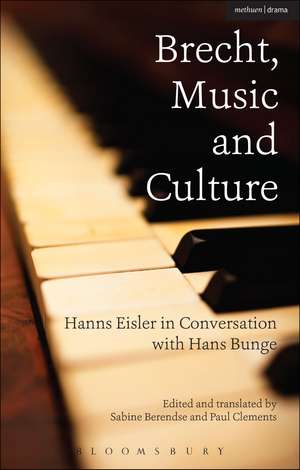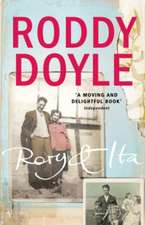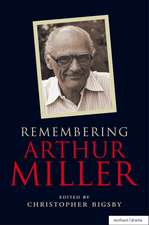Brecht, Music and Culture: Hanns Eisler in Conversation with Hans Bunge
Autor Hans Bunge Traducere de Sabine Berendse, Paul Clements Autor Hanns Eisleren Limba Engleză Paperback – 22 oct 2014
| Toate formatele și edițiile | Preț | Express |
|---|---|---|
| Paperback (1) | 179.10 lei 6-8 săpt. | |
| Bloomsbury Publishing – 22 oct 2014 | 179.10 lei 6-8 săpt. | |
| Hardback (1) | 540.38 lei 6-8 săpt. | |
| Bloomsbury Publishing – 22 oct 2014 | 540.38 lei 6-8 săpt. |
Preț: 179.10 lei
Preț vechi: 222.34 lei
-19% Nou
Puncte Express: 269
Preț estimativ în valută:
34.27€ • 37.22$ • 28.79£
34.27€ • 37.22$ • 28.79£
Carte tipărită la comandă
Livrare economică 22 aprilie-06 mai
Preluare comenzi: 021 569.72.76
Specificații
ISBN-13: 9781472528414
ISBN-10: 1472528417
Pagini: 312
Ilustrații: 5 bw integrated illus
Dimensiuni: 138 x 216 x 19 mm
Greutate: 0.36 kg
Editura: Bloomsbury Publishing
Colecția Methuen Drama
Locul publicării:London, United Kingdom
ISBN-10: 1472528417
Pagini: 312
Ilustrații: 5 bw integrated illus
Dimensiuni: 138 x 216 x 19 mm
Greutate: 0.36 kg
Editura: Bloomsbury Publishing
Colecția Methuen Drama
Locul publicării:London, United Kingdom
Caracteristici
Of interest to range of a disciplines: including music, theatre, history, philosophy and German culture
Notă biografică
Hanns Eisler was an Austrian composer. A Schoenberg pupil and committed Marxist, he was one of the great distinctive musical personalities of the twentieth century. Hans Bunge was assistant director and dramaturg at the Berliner Ensemble in Germany in the 1950s and later became first director of the Brecht Archive. He published his conversations with Eisler in Germany under the title Gespräche mit Hans Bunge - Fragen Sie mehr über Brecht.Sabine Berendse, the daughter of the late Hans Bunge, is a Librarian and Information Specialist in Berlin, Germany. Paul Clements was Principal of Mountview Academy of Theatre Arts in London, UK, for twelve years until his retirement in July 2008. He has taught, acted and directed in the UK, Canada and Scandinavia.
Cuprins
Notes to the German edition by Hans BungeTranslator's noteConversation 1 14 Ways of Describing Rain - Meetings between Brecht and Arnold Schoenberg, Charlie Chaplin and Thomas Mann - Brecht and MusicConversation 2 Galileo - Hollywood Elegies - Brecht and Feuchtwanger - Brecht and Music for the Theatre - Schweyk in the Second World WarConversation 3 Brecht on Arnold Schoenberg - Gestic Music - The Caucasian Chalk Circle - Döblin's 65th Birthday PartyConversation 4 Music for The Private Life of the Master Race - Prologue to Galileo - Eisler and the House Committee on Un-American Activities - The Mother in New York - Brecht and Stefan Zweig - BajazzoConversation 5 Brecht's Hexameters for the Communist Manifesto - Was Brecht a Marxist? - Brecht's Method of VerfremdungConversation 6 'To Those Born Later' - Boogie-Woogie - Eisler on Religion - GalileoConversation 7 'Hotel Room 1942' - HölderlinConversation 8 On Stupidity in Music I - HölderlinConversation 9 Hans Mayer's book on Brecht - Brecht and Georg LukácsConversation 10 The Music to Schweyk in the Second World War - On Stupidity in Music IIConversation 11 Hölderlin Poems - On Stupidity in Music IIIConversation 12 Eisler on Classical Literature, on the Function of Art, on Cybernetics and on NapoleonConversation 13 Serious Songs - Eisler's Plans for a SymphonyConversation 14 Eisler and Bunge Compare Their Experiences as SoldiersAfterword: For the First Edition of the 'Conversations' by Stephan HermlinNotesAppendixIndex
Recenzii
Th[is] edition is a labour of love. ... Together with Paul Clements, [Berendse] has crafted not only a readable but a highly engaging rendition of a series of conversations whose length makes them suitable for a sustained read or a more relaxed series of perusals ... [This] edition offers rich anecdotal accounts of Brecht, the German Democratic Republic, and disquisitions on the relationship between politics and music.
Eisler's conversations with Hans Bunge about Brecht focus on their time together in Hollywood as well as on the building of a 'magnificent' new social republic. For Eisler, the 'be-all and end-all' of their work was to 'educate the teacher!' . The most fascinating and perplexing aspect of the conversations turns on the effort to 'study the effect of art on human beings.' . The lesson of the great modernists was the lesson of socialism. In other words, ending capitalism was the precondition for making and understanding great art.
The important achievement of the translators ... is to have made available to the English-speaking world a landmark volume published almost forty years ago
As Brecht's essay on "gestic music" makes clear, the concept of gestic performance emerged from his close collaborations with composers. Bloomsbury's companion volume, Brecht, Music and Culture, is thus doubly welcome, first for translating Eisler's thoughtful conversations with Hans Bunge, Fragen Sie mehr über Brecht (1970), and second for explaining rather than mis-translating Verfremdung and so helping to consolidate a Brecht lexicon consistent with the new Brecht on Theatre. This publication also draws attention to the uneven transmission of Brecht's musical collaborators' critical commentary, as well as musical compositions.
Eisler's conversations with Hans Bunge about Brecht focus on their time together in Hollywood as well as on the building of a 'magnificent' new social republic. For Eisler, the 'be-all and end-all' of their work was to 'educate the teacher!' . The most fascinating and perplexing aspect of the conversations turns on the effort to 'study the effect of art on human beings.' . The lesson of the great modernists was the lesson of socialism. In other words, ending capitalism was the precondition for making and understanding great art.
The important achievement of the translators ... is to have made available to the English-speaking world a landmark volume published almost forty years ago
As Brecht's essay on "gestic music" makes clear, the concept of gestic performance emerged from his close collaborations with composers. Bloomsbury's companion volume, Brecht, Music and Culture, is thus doubly welcome, first for translating Eisler's thoughtful conversations with Hans Bunge, Fragen Sie mehr über Brecht (1970), and second for explaining rather than mis-translating Verfremdung and so helping to consolidate a Brecht lexicon consistent with the new Brecht on Theatre. This publication also draws attention to the uneven transmission of Brecht's musical collaborators' critical commentary, as well as musical compositions.













